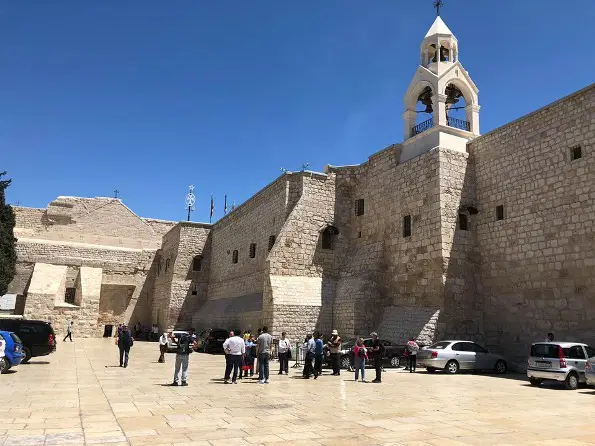Headline
10 Most Religious Cities In The World

Religion has long played a crucial role in shaping human societies, providing both unity and division throughout history.
The following ten cities have witnessed epic religious events and continue to serve as pilgrimage sites for millions.
1. Mecca, Saudi Arabia
Mecca, the holiest city in Islam, attracts millions of Muslims each year for the Hajj pilgrimage, one of the Five Pillars of Islam. This journey is obligatory for every capable Muslim at least once in their lifetime. Non-Muslims, however, are not permitted to enter Mecca. The city’s history dates back to a pre-Islamic legend involving Adam and Eve. More accurately, around 2000 BC, Abraham and his son Ishmael built the Kaaba, Islam’s most sacred site. In 570 AD, the Prophet Muhammad was born here, and later in 630 AD, he declared the city a center for Muslim pilgrimage.
2. Lhasa, Tibet
Lhasa, meaning “place of the gods,” was the home of the Dalai Lamas from the 1600s until 1959. Although Tibetans are now a minority, the city remains a hub for Tibetan Buddhism. Notable sites include Jokhang Temple and the Potala Palace, both UNESCO World Heritage Sites. Many pilgrims come to Lhasa to follow one of the three pathways that lead around Jokhang Temple, seeking spiritual merit.
READ ALSO: Top 10 Countries With Highest Number Of Churches 2024
3. Bethlehem, West Bank
Bethlehem is revered as the birthplace of Jesus, making it a major pilgrimage destination for Christians, especially during Christmas and Easter. It is also historically significant as the birthplace of David, the King of Israel. Despite the city’s tumultuous past, including numerous invasions and occupations, it remains a focal point of Christian pilgrimage. The Church of the Nativity, one of the world’s oldest churches, is believed to mark the location of Christ’s birth.
4. Varanasi, India
One of India’s most sacred cities, Varanasi holds religious importance for Hindus, Buddhists, and Jains. Legend states that the city was founded by Lord Shiva, while historical records suggest it emerged 3,000 years ago as a center for textiles. Many Hindus come to Varanasi to bathe in the Ganges River, which is believed to cleanse sins. The city is also notable as the place where Buddha delivered his first sermon.
5. Vatican City
Situated in Rome, Vatican City is the epicenter of the Roman Catholic Church. The world’s smallest independent state, it holds some of the most significant religious and cultural sites, including St. Peter’s Basilica, the Sistine Chapel, and the Vatican Museums. Once part of the Papal States, it became independent in the 20th century after a treaty signed by Mussolini.
READ ALSO: Northern Group Wants Tinubu Address Fuel Price Hike, Appoint Petroleum Minister
6. Haifa, Israel
Haifa, a city on Mount Carmel overlooking the Mediterranean, is a center for the Bahá’í faith. The Bahá’í World Center, with its golden-domed shrine, is a UNESCO World Heritage Site. Bahá’í, a religion founded in 19th-century Iran, emphasizes unity among all religions and the oneness of humanity.
7. Salt Lake City, Utah
Salt Lake City was founded in 1847 by Mormon pioneers escaping persecution. Today, it serves as the headquarters of The Church of Jesus Christ of Latter-day Saints (LDS). The city’s religious landmarks include the iconic Salt Lake Temple, which took 40 years to complete, and the Family History Library, the largest genealogical library in the world.
READ ALSO: Top 10 African Countries With Largest Active Military Manpower In 2024
8. Jerusalem, Israel
Jerusalem is a spiritual hub for Judaism, Christianity, and Islam. It has been a focal point of religious significance for millennia and has faced destruction and invasion multiple times. Sites like the Temple Mount, Church of the Holy Sepulchre, and the Western Wall draw millions of pilgrims annually. The Old City of Jerusalem, a UNESCO World Heritage Site, remains a testament to the city’s profound historical and religious legacy.
9. Pushkar, India
One of India’s oldest cities, Pushkar is a sacred site for Hindus. The city is associated with Lord Brahma, the Hindu god of creation. Pilgrims visit Pushkar Lake and the Brahma Temple, one of the few temples dedicated to Brahma. The city is also home to the Pushkar Fair, one of the world’s largest camel fairs.
10. Medina, Saudi Arabia
Medina is the second holiest city in Islam after Mecca. It is where the Prophet Muhammad sought refuge after being driven from Mecca. The Prophet’s Mosque, Al Masjid al-Nabawi, stands on the site of Muhammad’s home and is where he is buried. Only Muslims are permitted to enter the city, which serves as a key stop during the Hajj pilgrimage.
These cities offer a deep spiritual experience for visitors, filled with history and religious significance.
VANGUARD
Headline
U.S. Lawmaker Reacts To Nigeria, U.S. Airstrikes

United States Congressman, Riley Moore, has stated that President Donald Trump is determined to put an end to the killing of Christians in Nigeria, warning that further action may follow if the violence persists.
Moore made the statement on Friday via his official X handle.
According to the lawmaker, the strike represents the first step in addressing what he described as the ongoing slaughter of Christians and the broader security crisis affecting Nigerians across religious and ethnic lines.
READ ALSO:US Dept Of War Shares Video Of Air Strikes In Nigeria
“President Trump has been clear that the killing of Christians in Nigeria must end,” he said.
He that the administration’s resolve on the matter should not be underestimated.
“As I stated at the outset: Do not test President Trump‘s resolved in this matter.
READ ALSO:JUST IN: US Forces Bomb Terrorists Camps In Nigeria
“Tonight’s strike in coordination with the Nigerian government is just the first step to ending the slaughter of Christians and the security crisis affecting all Nigerians,” he said.
He stressed that the operation signals a stronger stance by the United States in support of Nigeria’s efforts to tackle terrorism and violent extremism, noting that further measures could be taken if the situation does not improve.
Headline
US Dept Of War Shares Video Of Air Strikes In Nigeria

A video footage of the US military air strikes in Nigeria has emerged.
The video was released by the US Department of War following its air strikes against terrorists in Sokoto.
Earlier, the US secretary of War, Pete Hegseth had confirmed that military air strikes hit terrorists in Nigerians, saying it was deadly.
Later on, the US. African Command, confirmed that it conducted the attacks described as very deadly by President Donald Trump.
Trump said he was only keeping the promise he made earlier last month to strike the terrorists he believes are killing innocent Christians.
READ ALSO:JUST IN: US Forces Bomb Terrorists Camps In Nigeria
Although described as powerful and deadly, the casualty caused by the attack is yet to be released.
Explaining further, security expert, Brant Philip, said the strikes may have been launched “from the USS Paul Ignatius, using a Tomahawk missile.”
The Nigerian government through its ministry of foreign affairs has also confirmed that the strikes were successful.
Watch video here
Headline
JUST IN: US Forces Bomb Terrorists Camps In Nigeria

United States President Donald Trump said US forces conducted deadly strikes against Islamic State terrorists in northwestern Nigeria, and vowed more attacks if the militants keep killing Christians.
“I have previously warned these Terrorists that if they did not stop the slaughtering of Christians, there would be hell to pay, and tonight, there was,” Trump posted on his Truth Social platform, adding that “the Department of War executed numerous perfect strikes.”
READ ALSO:JUST IN: Kano Lawmaker, Sarki Aliyu Daneji, Dies Hours After Colleague’s Passing
Trump stated that the Department of War “executed numerous perfect strikes, as only the United States is capable of doing. Under my leadership, our Country will not allow Radical Islamic Terrorism to prosper.”
The US president wished everyone Merry Christmas, “including the dead Terrorists, of which there will be many more if their slaughter of Christians continues.”
Details later.

 News4 days ago
News4 days agoPHOTOS: New Era In Furupagha-Ebijaw As Okpururu 1 Receives Staff Of Office

 News4 days ago
News4 days agoUBTH CMD Marks 120 Days In Office, Expresses Commitment To Providing Conducive Working Environment

 News4 days ago
News4 days agoOPINION: Gumi And His Terrorists

 News4 days ago
News4 days agoFIRS Confirms NIN As Tax ID

 News4 days ago
News4 days agoFG Declares Public Holidays For Christmas, New Year Celebrations

 Metro3 days ago
Metro3 days agoFintiri Pardons Man Sentenced To Death For ‘Killing Herdsman In Self-defence’, Others

 News4 days ago
News4 days agoOPINION: Christmas And A Motherless Child

 News3 days ago
News3 days agoJUST IN: Kano Lawmaker, Sarki Aliyu Daneji, Dies Hours After Colleague’s Passing

 News4 days ago
News4 days agoOPINION: My Man Of The Season

 News4 days ago
News4 days agoKWAM 1 Withdraws From Awujale Race, Ends Court Challenge






























